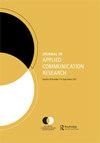Fake news by any other name: phrases for false content and effects on public perceptions of U.S. news media
IF 1.7
2区 文学
Q2 COMMUNICATION
引用次数: 2
Abstract
ABSTRACT The term ‘fake news’ aims to delegitimize news and is weaponized by political leaders and partisan media. Research has noted the negative impact of the phrase ‘fake news’ yet little work has investigated alternative discourse. We explore whether the phrase ‘fake news’ is distinct from alternative phrases such as ‘misinformation’ and ‘false news.’ Using two experiments, we compare effects of these phrases on evaluations of trust and credibility regarding U.S. news media. Results indicate that ‘fake news’ exerts disproportionate negative effects on perceptions of news and journalists, when controlling for political ideology, compared to ‘misinformation.’ Effects are pronounced when the phrase is used by a politician. Findings challenge research to address the communicative underpinnings of the fake news phenomenon rather than focus on “fake news” as a varietal of misinformation. Insights are discussed for news organizations seeking to distance themselves from the term while providing audiences with accurate information.假新闻:指虚假内容和对公众对美国新闻媒体看法的影响
“假新闻”一词旨在使新闻合法化,并被政治领导人和党派媒体武器化。研究已经注意到“假新闻”一词的负面影响,但很少有研究调查其他话语。我们探讨了“假新闻”这个短语是否与“错误信息”和“虚假新闻”等替代短语不同。通过两个实验,我们比较了这些短语对美国新闻媒体信任和可信度评估的影响。结果表明,与“错误信息”相比,在控制政治意识形态的情况下,“假新闻”对新闻和记者的看法产生了不成比例的负面影响。当政治家使用这句话时,效果会很明显。研究结果对解决假新闻现象的传播基础的研究提出了挑战,而不是把“假新闻”作为一种错误信息。为新闻机构寻求与术语保持距离,同时为受众提供准确的信息,讨论了见解。
本文章由计算机程序翻译,如有差异,请以英文原文为准。
求助全文
约1分钟内获得全文
求助全文
来源期刊

Journal of Applied Communication Research
COMMUNICATION-
CiteScore
4.00
自引率
8.70%
发文量
52
期刊介绍:
The Journal of Applied Communication Research publishes original scholarship that addresses or challenges the relation between theory and practice in understanding communication in applied contexts. All theoretical and methodological approaches are welcome, as are all contextual areas. Original research studies should apply existing theory and research to practical solutions, problems, and practices should illuminate how embodied activities inform and reform existing theory or should contribute to theory development. Research articles should offer critical summaries of theory or research and demonstrate ways in which the critique can be used to explain, improve or understand communication practices or process in a specific context.
 求助内容:
求助内容: 应助结果提醒方式:
应助结果提醒方式:


